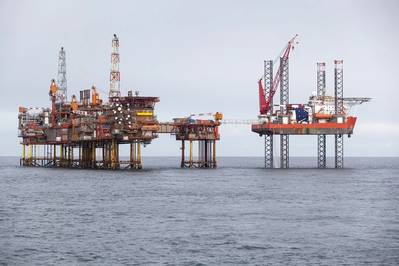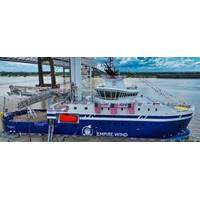North Sea Oil Market Sounds Alarm on Oversupply
The North Sea physical oil market is letting off a distress signal - crude is once again being stored on ships – as production increases from major exporters threaten a fragile balance between global supply and demand.
Reuters data shows nearly 7 million barrels of North Sea crude held on ships that have been static for at least two weeks, unable to find immediate buyers, up from virtually nothing a few weeks ago.
"Over the past two weeks, North Sea floating storage has trended higher, reversing a pattern of decline in place through much of July," Reid L'Anson, an analyst for energy analytics firm Kpler, said in a note.
According to Reuters data, over the last 20 years, August is one of the seasonally strongest months for North Sea crude prices.
Yet prices for Forties crude - the largest of the North Sea streams - have fallen to their lowest in a month, after a raft of offers for cargoes held on ships, one of the most expensive storage options.
A slowdown in demand from Asia's big refiners has dented the Atlantic Basin crude market, just as some of the world's largest suppliers such as Saudi Arabia, Russia and the United States are bumping up production.
But the impact has been most severe in the North Sea. Not only have the likes of Forties and light, sweet grades such as Ekofisk had to deal with a drop in Chinese refinery demand, they have also faced competition on their doorstep from a record influx of U.S. shale oil.
Shipments of West African crude to the likes of China, India and Japan reached a 2018 high of 2.44 million barrels per day in July, nearly a quarter more than the same month last year.
By contrast, exports of North Sea crude to Asia collapsed by 40 percent year-on-year in the same month to around 1.46 million bpd, which contributed to a drop of 17 percent in overall global loadings, according to Reuters shipping data.
Prompt-loading cargoes are now trading near their largest discount, or contango, to those for delivery in a month's time since April last year. The wide availability of crude grades has made this a buyer's market, traders said.
The North Sea market underpins the Brent benchmark futures contract, against which the bulk of the world's oil trades are pegged and which acts as a bellwether for the health of the global crude market.
"(That) the Brent forward curve has been in contango since mid-July also shows that there is no shortage at present," Commerzbank analysts wrote on Tuesday.
Indeed, JPMorgan said its traders had partially closed a bet on a further increase in the premium of near-dated Brent futures to those further in the future.
"The increase in oil supply from Saudi Arabia and Russia in July has led to a potential rise in global floating inventory, as markets are awash with oil in the physical market despite 3Q18 being a strong fundamental quarter," the bank's analysts said in a weekly note.
Reporting by Amanda Cooper





